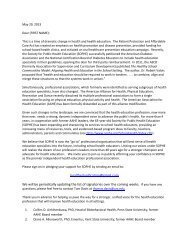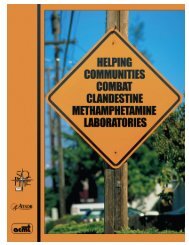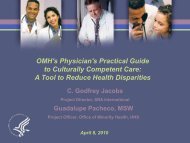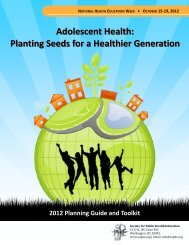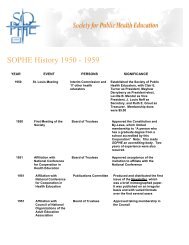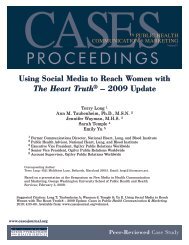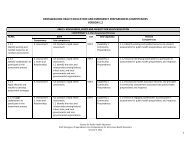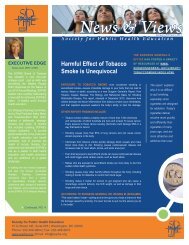Download - Society for Public Health Education
Download - Society for Public Health Education
Download - Society for Public Health Education
- No tags were found...
Create successful ePaper yourself
Turn your PDF publications into a flip-book with our unique Google optimized e-Paper software.
Conference Abstracts38evaluation technique Gumbly-tree, to compare their selfperceptionbe<strong>for</strong>e and after LESY-workshop. At pre-evaluationthe frequent practices were, <strong>for</strong> O1: GF (n=11), S and EH (n=10);<strong>for</strong> O2: F&V (n=15), SU and E (n=9). For O3: GF and S (n=1). Atpost-evaluation the frequency of the six practices classified inO1 increased, being the most frequent: S (n=17), GF (n=16), EH(n=15). F&V was the practice most frequently classified in O2(n=12), followed by E (n=5). EPAP classified in O2 decreased, andno practice was classified in O3. Women moved from O3 andO2 to O1. The two women reporting O3 <strong>for</strong> S and GF completelydeveloped the practice by the end. The overall self-perceptionimproved; trough analyzing their own Gumbly-tree womenperceived a change around self-esteem, and the way they thinkregarding to food and what other people say about them.Conclusions. After participating on LESY-workshop, womenincreased intention to change and developed improvedEPAP. The participatory approach and experiential-learningcyclewere an important component in women changingtheir behavior and their attitude towards EPAP, as it was builtupon reflection and hands-on activities, allowing women todevelop their own solutions suited to their own context.Project Based Learning: Learning and ApplyingSkills <strong>for</strong> Policy and Environmental ChangeLydia Burak, PhD, CHES, Bridgewater State UniversityProject based learning (PBL) enables students to learn andapply health education knowledge and processes through theengagement in authentic projects, including research studiesand health education programs. Underpinned by research onmotivation, cognition, and expertise, project based learningprojects are focused on questions or problems that requirestudents to encounter and engage with the central conceptsand principles of a discipline. The concepts and principles ofpolicy development and environmental change can be learnedand applied using a PBL approach. The theoretical frameworkupon which PBL is based includes experiential learning theoryas well as the theory of constructivism. This presentation will1) address the definitions, characteristics, and processes ofPBL and will 2) describe two recent PBL projects conductedby health education students: a project to make a universitycampus 100% tobacco free, and a plastic recycling project. Foreach of the projects, the students chose the topics, locatedthe resources, and planned the activities. Intervention 1: Thetobacco free project addressed the problem of individualshaving to walk through crowds of smokers and clouds of smokeoutside of university buildings, as well as smoking relatedlitter on campus grounds. Project methods included surveydevelopment to assess support <strong>for</strong> a ban on all tobacco use,collaborative ef<strong>for</strong>ts with other campus entities, an educationalcampaign to educate the university about the dangers ofsecond and third-hand smoke, the development of a petitionto propose the tobacco ban, and the gathering of signatures.Result: As of September 2011, the campus will be 100% smokefree. Intervention 2: The recycling project addressed theproblem of university cafeteria patrons throwing plastic bottlesinto trash cans despite the presence of recycling bins rightnext to the trash cans. The method that was used was thedesign of a table tent that was placed on all cafeteria tablesand bars. Result: The result of this project was a near doublingof recycling, from 31% to 61%. Each of the projects requiredthat students apply their knowledge of needs assessment,survey development and administration, collaboration,SOPHE 62nd Annual Meetingintervention development and execution, and data analysis.In addition to being a vehicle <strong>for</strong> teaching and learning theresponsibilities and competencies of health educators, and inaddition to improving the campus environment, a problembased learning approach provides students with confidenceand a sense of identity as health education professionals.Didactic Training in Epidemiology:An Imperative <strong>for</strong> Systems Change to Supportthe Role of <strong>Health</strong> <strong>Education</strong> SpecialistsAdenike Bitto, MD, MPH, DRPH, CHES, FRSPH, East StroudsburgUniversity of Pennsylvania; Amar Kanekar, PhD, MPH,MB., B.S, CHES, CPH, East Stroudsburg UniversityBackground: <strong>Health</strong> education specialists practice in a fastchanging world with complex health conditions affectingcommunities. Global concomitants include possible longterm/far-reachingeffects of Japanese Fukushima Daiichinuclear disaster, recent disastrous flooding in the Midwest,raging fires in the Southwest, and destructive tornadoesin other parts of the U.S. All of this is associated with anunprecedented obesity epidemic among youth and adults,chronic conditions including diabetes, hypertension, metabolicsyndrome, and cancer. Furthermore, behavioral problemsabound among youth and community members. Certainly,the time is ripe <strong>for</strong> systems change in health educationpractice. However, since no man or team of experts is anisland, health educators will need trans-disciplinary inputacross the spheres of public health, of which epidemiology isa core area. This paper presents findings from an explorationand study of the perceived role of epidemiology contrastedwith its actual importance <strong>for</strong> systems change as applicableto health education specialists. Theoretical Framework:The Social Ecological framework clearly delineates howboth trainee and expert health educators do not practice inisolation, but practice at multiple levels including schools,communities, workplaces, hospitals, and organizational, plusthe individual level. There<strong>for</strong>e a multidisciplinary emphasis ontraining will better equip future health education practitioners<strong>for</strong> their future roles. Thus the epidemiological principlesare transferred at different levels <strong>for</strong> successful outcomes.Hypothesis: The purpose of this study was to examine thedifference between perceived role of epidemiology in healtheducation specialist training versus the actual importanceof epidemiology within the health education specialists’ skillset. Methods: Within a college setting, students made acase <strong>for</strong> and against the topic of interest; namely, the role ofepidemiology training <strong>for</strong> health education specialists. Thiswas preceded by the authors’ prior research into the topic;and these findings were then presented to students withensuing discussion. Results: Results showed a dichotomousresponse of health education specialists. Some perceivedthat epidemiological training is of lesser importance, whileothers attributed the diverse roles played by health educationspecialists to sound epidemiological training. Conclusion andImplications <strong>for</strong> Practice: <strong>Health</strong> education specialists willincreasingly need to understand the epidemiological principlesunderlying systems change; given the plethora of diseases,contrasted with the demonstrated paucity of epidemiologistsin the U.S., and the dire need <strong>for</strong> systems change to deal moreeffectively with these myriad conditions. This will furtherenhance the health education specialists’ competency inapplying diverse control strategies within a changing world.




